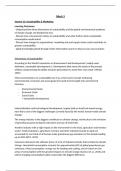Block 3
Session 13: Sustainability & Marketing
Learning Outcomes:
- Understand the three dimensions of sustainability and the global environmental problems
of climate change and biodiversity loss.
- Discuss how consumerism relates to sustainability and what further action sustainable
consumption would entail.
- Discuss how changes to organisations’ marketing mix and supply chains could contribute to
greater sustainability.
- Apply knowledge gained through online information search to discuss your own practices.
Dimensions of Sustainability
According to the World Commission on Environment and Development’s widely used
definition, sustainable development is ‘development that meets the needs of the present
without compromising the ability of future generations to meet their own needs’ (WCED,
1987).
Most commentators on sustainability see it as a three-part concept embracing
environmental, economic and social goals that need to be brought into some kind of
harmony.
- Environmental Goals
- Economic Goals
- Social Goals
= Sustainable Development
Industrialisation and technological development, largely built on fossil fuel-based energy,
have led to one of the biggest challenges currently faced by the world: human-made climate
change.
The energy industry is the biggest contributor to climate change, mainly due to the emission
of greenhouse gases during the extraction and use of fossil fuels.
Another industry with a high impact on the environment is the food, agriculture and forestry
sector. Food production, agriculture, forestry and other industries based on land use
accounted for one third of all human-made greenhouse gas emissions in the decade leading
up to 2016 (IPCC, 2019).
Consumer demand is the ultimate driver of a lot of industrial activity that is linked to climate
change. Household consumption accounts for approximately 60% of global greenhouse gas
emissions. Meat consumption, energy use for heating and cooling, and air travel are the
areas of consumption with the greatest impact on climate change (Ivanova et al., 2016) and
where changing consumption habits could make the biggest difference.
, Biodiversity Loss
Massive biodiversity loss on a global scale – or what has also been called the sixth global
mass extinction of species – is now an increasingly evident environmental sustainability
threat. Biodiversity loss and climate change reinforce each other.
Put simply, biodiversity refers to the variety of life on earth in all its forms and interactions.
More formally, biodiversity can be looked at on several levels, starting with the diversity of
genes, then the diversity of individual species, then the diversity of communities of species,
and finally the diversity represented in entire ecosystems such as forests or coral reefs,
where life interacts with the physical environment. These myriad interactions have made
earth habitable for billions of years.
The extinction rate of species is now thought to be about 1000 times higher than before
humans dominated the planet and may even be greater than the extinction caused by the
meteor hit that wiped out the dinosaurs 65 million years ago.
Human consumption is, again, the ultimate driver of many activities that threaten
biodiversity. The Dasgupta report (2021) states that a reform of food production and a curb
on overconsumption of foods such as beef are urgent goals. According to the report, curbing
population growth is an essential element in reducing over-consumption and the
biodiversity loss that stems from it. One of the most effective ways of addressing population
growth is better access to family planning and better education for women in particular, as
better education gives women more choices, and better-educated women have been found
to be major drivers for social change (UN, 2020).
Consumerism & Sustainability
Environmental and social problems are closely related to a phenomenon called
consumerism, sometimes also referred to as ‘consumer society’. Consumerism refers to
‘[t]he theory that an increasing consumption of goods is economically desirable [and/or] a
preoccupation with an inclination toward the buying of consumer goods’ (Merriam-
Webster, 2021).
Consumerism negatively affects sustainability through the over-consumption of finite
resources and the pollution created by the disposal of by-products and wastes (Crane et al.,
2019). This over-consumption drives climate change and biodiversity loss. It is estimated
that 1.6 times the resources on Earth would be needed to sustain current consumption
levels into the future. Consumerism has even been likened to a disease that makes human
societies and ecosystems ill (De Graaf et al., 2014).
A culture of consumption will not be easy to change – it is deeply embedded in the
institutions and underlying assumptions of modern societies. These assumptions and
institutions are beneficial to powerful social, economic and political actors, such as big
corporations, who have an interest in maintaining current consumerist societies (Schaefer




